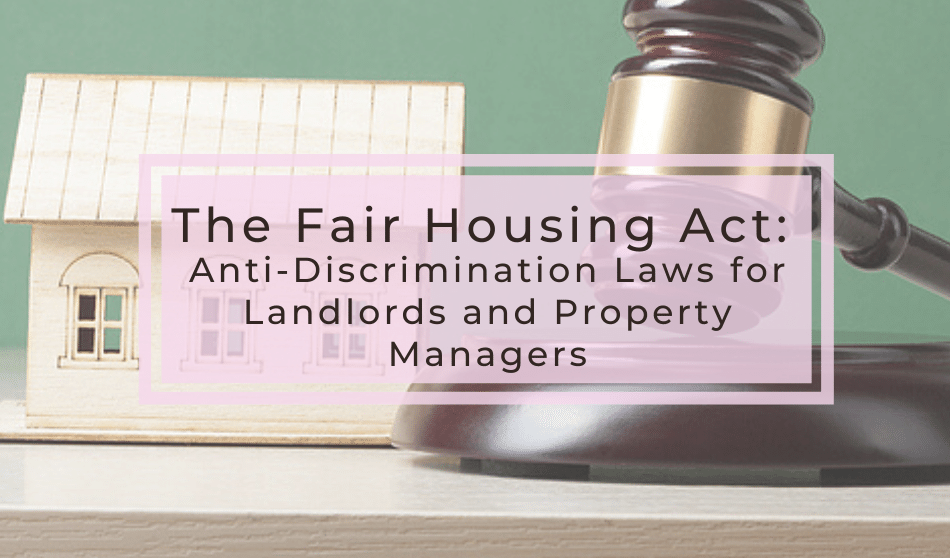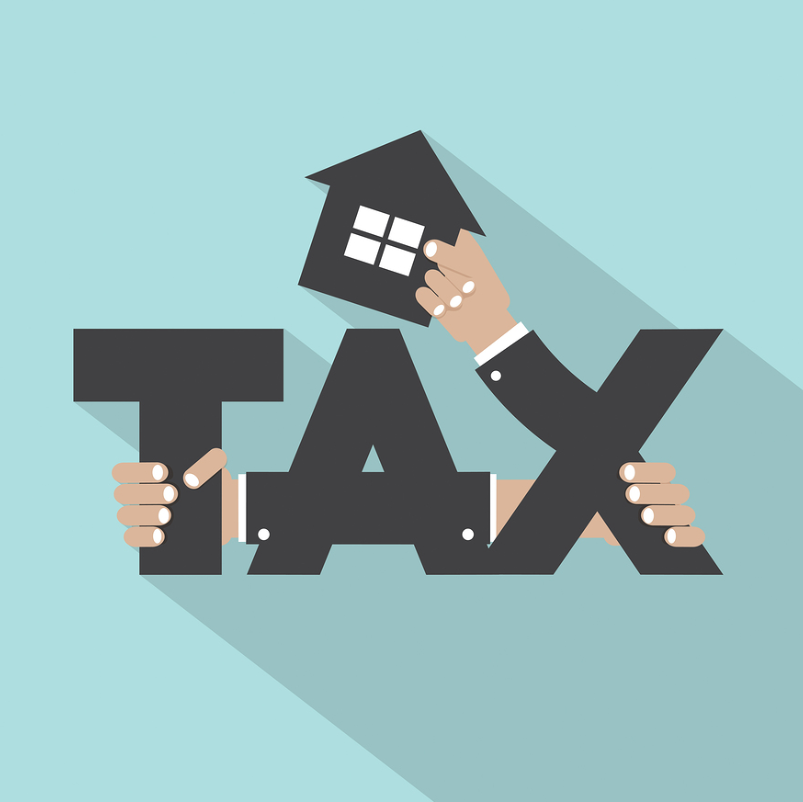
Landlords, property managers, and housing providers are required to honor the civil rights protections established under the Federal Fair Housing Act (Title VIII of the Civil Rights Act of 1968).
The Fair Housing Act is the set of laws associated with anti-discrimination laws for renters. The Fair Housing Act applies to all real estate transactions, including buying, renting, financing, and selling property.
The Fair Housing Act makes it illegal to refuse to rent to, negotiate with, or discriminate against any person based on their inclusion in a protected class.
Protect classes recognized under the Fair Housing Act include:
- Race
- Color
- Religion
- Sex (including gender identity and sexual orientation)
- Familial Status
- Handicap
- National Origin
The Department of Housing and Urban Development (HUD) is responsible for enforcing the Fair Housing Act.
According to HUD, under the Fair Housing Act, no one may take any of the following actions based on race, color, national origin, religion, sex, familial status, or handicap:
- Refuse to rent or sell housing
- Refuse to negotiate for housing
- Make housing unavailable
- Deny a dwelling
- Set different terms, conditions or privileges for sale or rental of a dwelling
- Provide different housing services or facilities
- Falsely deny that housing is available for inspection, sale, or rental
- For-profit, persuade owners to sell or rent (blockbusting) or
- Deny anyone access to or membership in a facility or service (such as a multiple listing service) related to the sale or rental of housing.
In Addition: It is illegal for anyone to:
- Threaten, coerce, intimidate or interfere with anyone exercising a fair housing right or assisting others who exercise that right
- Advertise or make any statement that indicates a limitation or preference based on race, color, national origin, religion, sex, familial status, or handicap. This prohibition against discriminatory advertising applies to single-family and owner-occupied housing that is otherwise exempt from the Fair Housing Act.
Additional Protection if You Have a Disability
If you or someone associated with you:
- Have a physical or mental disability (including hearing, mobility and visual impairments, chronic alcoholism, chronic mental illness, AIDS, AIDS Related Complex and mental retardation) that substantially limits one or more major life activities
- Have a record of such a disability or
- Are regarded as having such a disability
your landlord may not:
- Refuse to let you make reasonable modifications to your dwelling or common use areas, at your expense, if necessary for the disabled person to use the housing. (Where reasonable, the landlord may permit changes only if you agree to restore the property to its original condition when you move.)
- Refuse to make reasonable accommodations in rules, policies, practices or services if necessary for the disabled person to use the housing.
Examples of Fair Housing Act Discrimination
To further help landlords and property managers, let’s take a look at some scenarios that could be considered violations of the Fair Housing Act.
Requiring some renters to pay an additional security deposit, but not all renters to pay extra.
Explanation: You need to treat all renters equally. Even if you are requesting a high-security deposit because of a non-discriminatory reason, if the renter happens to belong to a protected class, he can file a legitimate claim against you.
Asking if the rental applicant has any kids, even in a casual conversation.
Explanation: You are not allowed to ask questions that allude to the familial status of a rental applicant. You can usually ask the number of occupants under 18, to make sure you meet your area’s occupancy laws. But you cannot specifically ask how many kids an applicant or tenant has.
Describing a property as family-friendly in a rental ad.
Explanation: A family-friendly property description can be discriminating towards familial status because applicants could reasonably conclude that families are preferred as tenants.
Asking for verification of immigration or citizenship status.
Explanation: It is illegal to discriminate against national origin, and asking for a rental applicant to verify their citizenship would violate this right.
You can’t tell your renters that you go to the church down the street.
Explanation: Religion is a protected class and a landlord who references their own religious preferences can make a renter feel like the landlord prefers tenants with similar religious beliefs.
These are just some examples of housing discrimination related to rental housing. There are a few exceptions to the Fair Housing Act, including 55+ housing communities and renters who belong to a protected class but are a threat to the health or safety of others or who currently use illegal drugs.
Housing providers are responsible for knowing the law and their obligations under the Fair Housing Act. Ignorance of the law is not an acceptable excuse for unintentional violations.
Disparate Impact
The Fair Housing Act bars both intentional discrimination and policies and practices that have a disparate impact, ie that do not have a state intended to discriminate but have the effect of discriminating against the Fair Housing Act’s protected classes, as explained by the National Low Income Housing Coalition.
In 2015, the U.S. Supreme Court ruled in favor of recognizing disparate-impact as valid claims for discrimination lawsuits under the Fair Housing Act. The June 2015 ruling, saw a 5-4 decision that an action can be considered discriminatory even if the intent was not.
Like all Fair Housing laws, the disparate impact ruling is established to give further protection to people belonging to a protected class, so they can have an equal opportunity to housing.
In the case of rental housing, a landlord or property manager could be charged with a Fair Housing claim on the grounds of disparate impact if their screening criteria or rental policies prevented a protected group from accessing housing. When a rental policy has no clear discriminatory intent, if the policy adversely affects a protected group’s access to housing, that policy may violate the Fair Housing Act on disparate impact. For example, disparate impact arises when a practice produces different effects across racial groups, even if the practice wasn’t racially motivated.
Disparate impact claims are meant to target “artificial, arbitrary and unnecessary barriers” to equal housing access.
Advice for Landlords and Property Managers
Every landlord and property managers need to be extremely familiar with the Fair Housing Act and all federal, state, and local housing laws.
Fair Housing and Tenant Screening
Once Fair Housing laws are understood, screening criteria should be in place that treats every applicant the same. Legal screening criteria can be based on an applicant’s credit report and criminal background, rental history, income, and employment verification, as long as the landlord can prove that every applicant was screened by the same standards and the basis for the rejection was due to an applicant’s potential inability to pay rent or would put the property, other residents, or the neighborhood in danger.
To protect oneself from disparate impact claims, a landlord must have supporting documentation that all applicants are treated exactly the same and a tenant was accepted or rejected based on legal screening criteria. By collecting all of this information, not only can landlords make an informed decision about prospective renters, but they can show in court that they had valid reasons to select one tenant over another.
Fair Housing and Rental Management
Beyond tenant screening, every landlord and property manager must treat all residents equally during their tenancy at your property.
Some examples of unequal treatment might include:
- Requiring some residents, but not all, to pay additional fees
- Preventing some residents, but not all, from using common facilities or resident services
- Requiring some residents, but not all, to prove residency when access the grounds, facilities, or property
Remember, even if the intent was not there, if a resident belongs to a protected class and feels like they have been discriminated against, they can file a Fair Housing or Disparate Impact claim against you.
Education and Training on Fair Housing
It is a good idea to provide regular education and training opportunities to your staff and employees about their responsibilities as housing providers to uphold the Fair Housing Act and treat all residents and applicants fairly and equally.
Fair Housing laws change often, so it is always a good idea to reevaluate your rental business policies and seek legal counsel from someone familiar with landlord-tenant laws in your state before setting new ones in order to proactively address these potential issues before it is too late.
So whether you are advertising your property, screening new tenants, or setting apartment rules, make sure that you are in compliance with the law and that any actions or policies apply to everyone (with supporting documentation), and cannot be construed as affecting some people but not others.
How does a renter file a discrimination claim?
If a renter feels like their civil rights are being violated under the Fair Housing Act, HUD is ready to help. The Housing Discrimination Complaint Form is available for renters to complete online or download and return.
HUD wants to know the filer’s name and address, the name and address of the person the complaint is against, the address of the housing involved, a short description to the alleged violation, and the date(s) to the alleged violation.
HUD will investigate the claim, attempt a conciliation, determine if there is cause to the claim, and, if necessary, hold a court hearing.
This article was originally published in May 2017 and has since been updated.






I wonder when the day might come- when Property Providers Say ENOUGH- I am through with providing- ITS just not worth the trouble any longer. I will take my capitol and move it else where. An actor- recording artist- or Athlete can make millions- but woe to the provider who dares try to make a dollar offering a service to a person needing a basic need- Shelter.
We own a mobile home in a mobile home park and there are new owners and they want a lease that contains outrageous rules, for example, they want all of the tenants, mobile home owners, to pay a flat fee of $75 per month for water/sewar and we do not have individual water meters. Is this even legal? Let alone ethical?
Toney Hoffer- So does this $75.00 fee cover water- sewer and garbage – or just water and sewer? Don’t know where you live but- in our new rental complex- tenants have their own water meter- city water per units averages about 65.00 per month- city sewer runs 20.00 per month and garbage runs another 20.00- does not sound too unreasonable to me.
I agree with Dennis. $75 sounds pretty normal for water/sewer. But you should be able to look up average water and sewer rates for your city.
Nope. The park has to pay those bills themselves and simply set the space rents such that they get enough income to cover their various expenses and still turn a reasonable profit.
Is OK to ask about Reasonable Accomodation? Because I believe I was just violated.
The exact logistics around reasonable accommodation are a little tricky. Examples of reasonable accommodation include allowing a tenant to install a wheelchair ramp (at the tenant’s expense); allowing a disabled tenant to move to a vacant first floor apartment if they are unable to use the stairs (the tenant would be reasonable for moving fees); allowing a registered emotional support animal for a tenant with a doctor’s verification for the need of an emotional support animal. These are just some examples.
If you feel like your rights have been violated, you should contact your local housing authority (just Google “[your city name] housing authority”). They will be happy to help and explain your rights per your local laws.
I am being denied public housing for in unclassified forfeiture which is not a criminal crime
Sorry to hear about that denial, Kacie. Each area has their own regulations about what is allowable criteria so you may want to ask for an adverse letter (denial letter) and then check with your local housing authority to ask them about public housing acceptance criteria so you can weigh your options.
Is it illegal for a property manager to tell another tenant you called the police on them?
Did you ask to be kept anonymous when you called the police or notified the property manager?
So I rented an apartment and the apartment is trying to give me the wrong apartment can they hold me to the lease?
Hi Tammy, I would certainly read your lease to see if the unit number was referenced. Then, I would contact your local housing authority, let them know the situation and if the unit was specified in the lease. They will let you know what the regulations are in your local area as some allow substitutions while other areas do not. All the best!
As a property manager/owner for a self managed covenant controlled community, we use the ACH system. 99% of our owners have no issue and prefer this system, plus the Association gets our monies in a timely fashion. One problem owner has been required to pay HOA dues by money orders or cashier’s checks due to being regularly in arrears, frequent delinquencies, bankruptcies, and insufficient fund status. That is the established process in the governing docs and resolutions. Same Decs also allow for processing and handling fees. We promote ACH as an incentive for owners to not pay by manual payment and avoid a processing fee. The problem owner is saying that requiring manual money order/cashier’s check is discriminatory. Is it ok to add on a processing fees for manual payments?
Thanks for sharing those details. Payment processing fee regulations are state-specific and may vary by type of HOA (condo vs single-family, etc.). Because I can’t offer legal advice I would recommend reaching out to an attorney familiar with your state HOA laws for guidance when considering making any changes to your HOA governing documents and CC&Rs.
One option you may want to discuss with your attorney is converting to 100% cashless/paperless payments. Many property management software platforms integrate with a cash payment network that allows the payee to pay by cash, debit, or credit card at a local convenience store instead of by check, cash, cashier’s check, or money order to the HOA. Typically a cash payment network charges a small processing fee directly to the payee (less expensive than purchasing a money order). Just know that there may be a setup fee and if the minimum number of monthly payments are not met, the HOA would have to absorb those fees. Having said that, it may be a small price to pay to say goodbye to manual check processing forever.
Here’s an article with a little more information: A Modern Rent Payment Option for Money Orders, Cash, and Checks
Can we honor gift letters as a source of income?
I am unable to offer legal advice but would advise reaching out to your local housing authority or real estate board as they will know your state regulations for acceptable income sources. You may then want to speak to your attorney to discuss your options if the source of income doesn’t honor their contribution.
If you do proceed forward, I would use caution and verify the gift source. A known charity, subsidized housing program, or employer is much different than a letter from a friend or relative. If from a friend or relative, are they willing to be a co-signer on the lease? If so, you would want them to fill out an application and go through your tenant screening process first before co-signing the lease.
What happens if I make every effort in accommodating the tenant with lease terms and she still will not sign it but has paid the increase in rent but is disputing some verbiage in the lease. Since she paid the increase does that mean she agreed to the new terms?
With proper notice, a rent increase can occur at the end of a lease term, even if that lease isn’t renewed. I can’t offer legal advice but it appears they are now on a month-to-month tenancy unless they sign the new lease. I would recommend you reach out to your local housing authority or real estate commission/board or attorney to verify.
Can a property manager ask prospects to provide income verification only in English if bank accounts, income, and other assets of income are outside US and not in English language? Can the prop manager deny the proof of income ? We had the documents transcribed to English but was still told that could not be accepted as proof Please advise
Nanette, That gets a little complicated and there might be some state specific nuances mixed in as well. Although I can’t advise on legal issues, I suggest contacting your local housing authority and found this link to the US Department of Housing and Urban Development (HUD) for more information and contact information for a field office in your area that might be helpful: https://www.hud.gov/program_offices/fair_housing_equal_opp/contact_fheo
I had to move to florida from Ohio because I could not find work. My wife could not come with me because our dog has bone cancer and can not make the trip. I am the only one on the lease and they will not provide me with a key for when my wife visits. They said she has to be on the lease. Because I have a company car they said I must purchase a garage because I am only allowed 1 spot and I have two cars. I have to pay 150 more a month for the garage. Later they told me that if my wife was on the lease they could give her a key and if she was on it from the start I would not have to had a garage. When I found that out I said I wouod like to add my wife to the lease. They said I still had to pay for the garage because it was in my lease agreement even though the garage had not been provided yet because the building where the garage is had not been finished yet. The garage is in a different building which is quite a distance. They are telling me that I have to park both cars there because that is where my garage is. My wife is still not on the lease because they will not accept a scanned copy of her driver’s license as a valid form of ID. At every opportunity I feel as if I am being discriminated against and bullied. Every time I ask the reasoning behind what they are telling me to do they just say fair housing act but never clarify anything.
Sean, many landlords put procedures in place about occupants, documentation, keys, parking, cars, garage access, etc, so that they treat every situation the same to avoid discrimination and favoritism — which is my guess why they are giving the reason of the fair housing act. There are nuances between a landlord not allowing flexibility after a lease is signed and discriminations against a protected group covered in the fair housing act. You might want to contact your local housing authority to discuss the details of your lease and situation to see if they can offer any clarity and/or advice for you going forward.
I signed a 34 page lease which isn’t worth the paper it’s written on. If I violate the terms of the agreement I can be evicted. The property owner is not a held accountable to uphold his end of the contract. Nothing in my lease is true. Since day two of moving in here I’ve been dealing with this. This property owner is now harassing me, had me put in jail for something I didn’t do, lied to the police. Nothing’s been done. I feel I’m entitled to damages and for him to be charged with breach of contract filing a false police report. So as an individual who’s disabled and on a fixed income I find it virtually impossible to get any assistance or anyone to care about tenants and what we have to put up with in regards to uncaring slumlords who do nothing but want to collect money. Even section 8 housing VA even though the building doesn’t pass inspection and they don’t pay the rent now the tenant gets evicted over not paying rent but the landlord never has to uphold the terms of the lease agreement and continues to be able to rent. I feel that property owners, management companies, etc. Should be held financially responsible for the damages that they put renters thru. They should have to financially pay for their neglect, abuse, breaking the law.
If I rent and other residents are owners in a mobile home park, should all residents get the same email notifications?
Hi Mayanna, I’d need a little more context to understand your situation. Are you renting directly from the mobile home park management or from a private home owner? If from a private home owner, have you been approved by the mobile home park management to rent with a signed agreement? Do you know the topics of the email notifications you feel you should have been copied on?
Without understanding your rental relationship, I would imagine that some email notifications would need to be directed to the home owner as they would have different responsibilities and obligations while other email notifications may be on topics for all residents. When in doubt, you might want to reach out to your state mobile home ombudsmen and local housing authority as some states and areas have different requirements.
I am 62 years old and thought I was buying a house but at the end of the day all I got was I’m invisible cuz you can’t see me but I’m paying everything I don’t know what to tell you I can’t see anything new help I guess I’m a black woman and that’s messed me up I don’t know